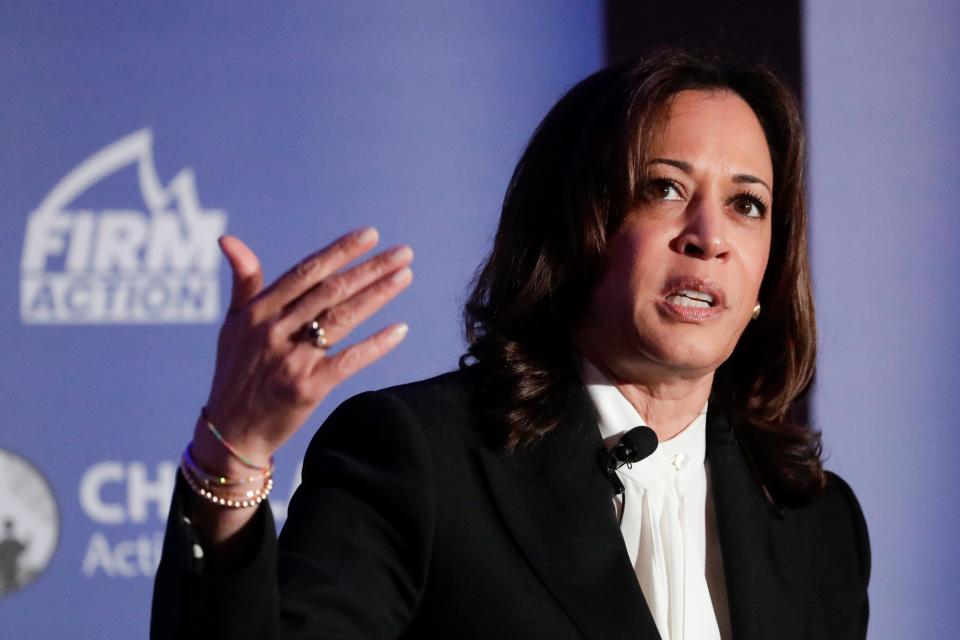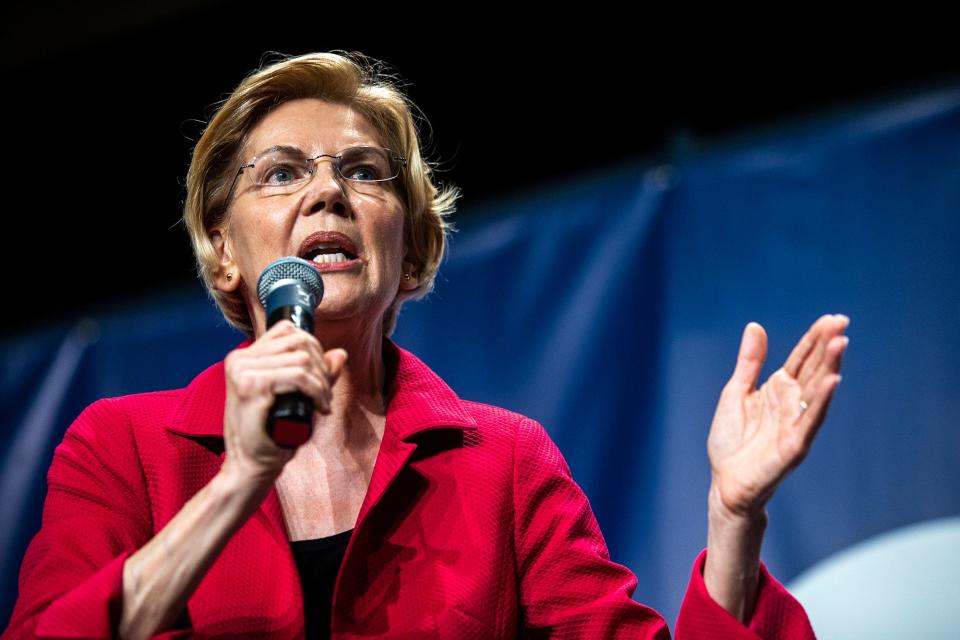Poll: What do Democrats want to hear about at the debates? (Hint: It's not Trump.)
Democratic voters will be paying close attention to the opening candidate debates next week, and they have strong views about what they want discussed.
Hint: It's not Donald Trump.
Health care, immigration, the economy, climate change, education and taxes top the list of issues Democrats told a USA TODAY/Suffolk University Poll they want to hear about during the two-night, 20-candidate debate marathon in Miami. President Trump, including efforts to get him out of the White House, ranked eighth in responses to the open-ended question, named by just 4%. Fewer than 1% cited "election interference."
"One of the key things is global warming; this is like the biggest issue of our lifetime," said Ethan Raboin, 29, a college student in Manchester, New Hampshire, who was among those surveyed.
Carlos Sandi, 46, of Gainesville, Georgia, said he is looking for a candidate who is "connected to the real issues that ordinary Americans face, not trigger issues that spike elections."
2020 elections: What you need to know so far
Nearly every Democratic voter in the poll called the debates crucial to sorting out a record field of contenders. An overwhelming majority, 82%, said they'll be watching, and 86% said the debates will be important in determining which candidate they'll support. More than half, 54%, called them "very important."
"It's kind of a dog-and-pony show," Jacob Cushman, 38, a registered nurse from Naples, Fla., said in a follow-up interview, but "hopefully it'll whittle down the candidates."
What to watch for: Biden vs. Sanders, other things to watch in first Democratic debate
The survey gave Joe Biden a big lead, but it could be a fragile one. Thirty percent of those likely to vote in Democratic primaries and caucuses said they were supporting or leaning toward the former vice president. Vermont Sen. Bernie Sanders was second at 15%, Massachusetts Sen. Elizabeth Warren third at 10%, South Bend Mayor Pete Buttigieg fourth at 9% and California Sen. Kamala Harris fifth at 8%.

The only other candidates backed by more than 1% were New Jersey Sen. Cory Booker at 2%, and former Obama Cabinet member Julian Castro and former Colorado governor John Hickenlooper at 1% each.
Widening the campaign map: Why 2020 candidates are looking beyond the early states to court voters
A burst of excitement
The survey also measured interest in the Democratic field – and the prospect of potential support – in another way.
When asked which candidates they would be "excited" to see running, Democrats and independents showed a surge of enthusiasm since the USA TODAY/Suffolk survey in March for Buttigieg (up 24 points to 31%), Warren (up five points to 37%) and Harris (up four points to 40%). That sense of excitement had dropped since March for Biden (down eight points to 51%) and former Texas congressman Beto O'Rourke (down eight points to 26%).
"After front-runner Joe Biden, Elizabeth Warren is the one who finishes in the money most," said David Paleologos, director of Suffolk's Political Research Center. "Warren polls as the second- or third-place choice four times out of 10, followed by Sanders (three times), Harris (twice) and Buttigieg (once)."

In the opening Iowa caucuses, that could prove crucial in amassing the 15% support required for a candidate to claim convention delegates.
The debates are a chance for a lower-tier contender to seize attention.
"There might be some flaming response from someone who just strikes me and I have no idea he would, and it would change my mind," said Edna Wilcock, 72, a retired pediatric nurse from Sequim, Washington, who now supports Biden. "That's why we have all these debates."
Who's running for president in 2020?: Meet the candidates in an interactive guide
The poll of 1,000 registered voters was taken June 11-15. The margin of error was three percentage points for the full sample, five points for the sample of 385 respondents who said they were likely to vote in Democratic primaries or caucuses, and four points for the combined sample of 618 Democrats and independents.
Trump formally kicked off his reelection campaign Tuesday night in Orlando with a rally before thousands of cheering, chanting supporters. In a defiant, meandering speech that lasted more than an hour, he boasted about his record in office on the economy and blasted his Democratic opponents as "socialists" and left-wing extremists.
At the moment, Americans are inclined to believe Trump will win a second term.
In the survey, voters by 49%-38% predicted Trump would prevail over an unnamed Democratic nominee. That included 86% of Republicans and 14% of Democrats.
Amy Angel, 59, a Democrat from Fairfax, Virginia, remembered what happened in 2016. "I really believed Hillary Clinton would win, and then she did not," the stay-at-home mother of five said. "We need to come together in a way that progressives and independents and Democrats did not manage in 2016."
She supports Biden, but that could change. "Biden currently has my vote to lose," she said. "I'm not 100%. He's not a perfect candidate, but the reality is no one is."
James Lay, 43, a Republican from Richmond Hill, Georgia, predicted Trump would triumph because of Democrats' divisions.
"There's no single candidate that is going to be able to consolidate the entire voter base to the point where they can beat him," said Lay, who works in sales. "Bernie people are Bernie people; they are not the same as Kamala Harris people, who aren't the same as Beto people, who aren't the same as Buttigieg people."
More from the poll: Most Americans want Trump to comply with House subpoenas. But impeach him? Not so fast
A warning flag for Trump
Asked whom they would support if the election were today, Trump held a narrow edge over an unnamed Democrat nominee, 40%-37%. Nine percent supported an unnamed third party candidate, and 14% were undecided.
Trump has consolidated more Republican support (83%) than his generic Democratic opponent has consolidated Democratic support (77%).
'We're off and running': A look at Trump's un-Trumpian campaign for reelection
A warning flag for Trump: Other national polls that test head-to-head contests between him and some of the leading Democratic candidates have shown the president trailing with support that has stayed steady at 40% to 42% – just where he stood in this survey. He presumably would need to expand his support to prevail in a two-way race.
In the Republican primaries, Trump's nomination seems all but guaranteed. In the poll, nine of 10 of those likely to vote in GOP primaries or caucuses supported him. Five percent would vote for former Massachusetts governor Bill Weld, a long-shot challenger.
Despite Trump's daunting lead, Republican voters still said by nearly 2-1, 60% to 36%, that they would like to see a GOP debate.
Timing matters: California's primary is way earlier in 2020. Is that good for Democrats?
Who is that again?
The Democratic debates next Wednesday and Thursday in Miami loom as a test for the better-known candidates and an opportunity for the more obscure ones. More than half of the Democratic voters said they had never heard of six of the 20 candidates who qualified to participate in the debates.
"This is going to be an introduction to those people who will actually watch the debate for a whole group of new, fresh faces," said Rand Hoch, 64, a retired judge from West Palm Beach, Florida. A former chair of the Palm Beach County Democratic Party, he was among those called randomly in the phone survey. He has been impressed by Buttigieg.

"He's the mayor from basically a small city that one has not heard of before, and he's coming up with great ideas," he said.
Tom Bryan, 72, a marketing and real estate agent from Columbus, Georgia, said O'Rourke "comes on strong" but is also interested in hearing from Biden and Warren. "The economy, health care are probably the two most important" issues, he said, "with the exception of our relationship with our partners around the world, which is going to hell in a handbasket."
There were signs that some Democratic voters were feeling overwhelmed by the number of choices. For 11 of the 20 contenders who will be on stage, more Democratic voters said they "hope this person drops out of the running" than said they were excited about their candidacy.
Many said they were struggling to decide between the candidate they liked best and the one they calculated would have the best chance of winning in November 2020.
"When it comes to policy and just smarts, Elizabeth Warren outshines pretty much everyone, but then I weigh with that, do I think she could get elected?" said Tanae McLean, 48, of Mooresville, North Carolina. "If you go by polling, obviously Joe Biden's a front-runner. Do I think he has the best ideas? I love Joe Biden, but no. ...
"I'm definitely open-minded at this point."
The debate lineup: Which candidates will face off in Miami?
Trump vs. Biden: Septuagenarian rivals try to demonstrate vigor in Iowa
This article originally appeared on USA TODAY: Poll: What do Democrats want to hear about at the debates? (Hint: It's not Trump.)

